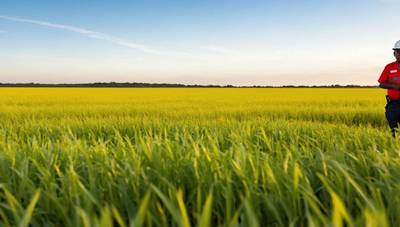COP30: Brazil seeks biofuel boom, but critics query climate impact
Brazil's COP30 pledge to use sustainable fuels is scrutinized
Scientists warn about land and food trade-offs due to biofuels
India's ethanol push shows strain despite Brazil success
Clar NiChonghaile & Bhasker Tripathi
Timothy Searchinger is a senior research scholar from Princeton University. He said that when land produces fuel instead of food someone else will have to clear more land or eat less.
Biofuels are counted at zero, so countries believe that they have cut emissions. He said that in reality, the pressure is shifted onto food and land systems.
India has already shown signs of this pressure. It has increased the percentage ethanol in petrol, and saved $12 billion on oil imports over the last decade.
It has also led to the destruction of engines and arable land.
According to a report from the International Renewable Energy Agency, Brazil's growth in biofuels over the long term has been more smooth. Biofuels powered about a quarter last year of the transportation sector, and 762,000 people were employed in related activities.
Roberto Braun said that Toyota has been involved in the production of biofuels for Brazil since 16 years. The company uses sugarcane and maize plantations as feedstock.
According to the International Energy Agency, meeting Brazil's goal, of quadrupling sustainable energy use by 2035 - a goal that 19 countries have already signed up for - would double global biofuel production.
GREEN BACKLASH
Green groups are worried about the potential destruction of nature and land in biodiverse areas such as Brazil and Indonesia.
Last month, Transport & Environment, a non-profit organization based in Brussels, reported that global biofuel production produces 16% more CO2 than fossil fuels they replace.
When the Brazilian COP30 presidency pitches the transition from fossil fuels, and mentions sustainable fuels the next breath, we have a road map for disaster," Ruairi Brogan said. Ruairi is a senior policy advisor at the wildlife charity Royal Society for the Protection of Birds UK.
The size of the pledge is what makes it so impressive. He said, "We don't own enough land to do that."
Braun responded to these concerns by stating that over the past 25 years 98% of agricultural expansion for biofuels has occurred on degraded lands. Braun cited the IRENA Report.
He said that blending ethanol was "not rocket-science" and that the technology had been well established in Brazil, and is being developed successfully in countries such as India.
Stricter safety guards for biofuels
Biofuels are seen by countries such as Brazil and India as a way to create jobs, reduce greenhouse gas emissions and boost economic growth.
The IEA stated that if biofuels are developed faster, they could result in cumulative investments of $1.5 billion across all fuel types sustainable by 2035. This would provide a welcome boost to the economies of emerging countries and rural areas.
A letter signed by over 100 scientists, sent before the COP30 conference, said that the growing demand for transport biofuels could require 52 million hectares by 2030. This is roughly equivalent to Spain's size.
They wrote that without strict safeguards and targets for crop-based energy, the food and forest crisis would worsen.
Cian Delaney is a T&E campaigner. "Safeguards such as caps on feed and food crops and not recognising high emitting feedstocks such as palm and soybean oil are essential," he said.
He warned that, when the first biofuel targets in Europe were introduced, a wave imports of palm oil led to deforestation across South East Asian nations, including Indonesia.
Biofuels can be produced in a more environmentally friendly way, for example, by using non-edible plant material, agricultural residues, or even algae.
In India and other countries, however, these technologies have had difficulty scaling up.
Searchinger, from Princeton, cited a study that he wrote for the World Resources Institute. The report stated that solar panels can generate 100 times more energy per hectare than biofuels.
India, despite these concerns, has doubled-down on its biofuel policy and began selling petrol with 20% ethanol or E20 this year, five years before schedule.
The government claims that the shift has led to not only savings on oil imports but also avoided 54 million metric tonnes of carbon emissions in the last decade.
The rapid roll-out has sparked concerns over diverted crops, and a reaction from drivers.
Ramya Natarajan, of the Center for Study of Science, Technology and Policy, said that India's experience shows how difficult it is to balance climate and agricultural goals.
According to the Delhi-based thinktank's analysis, India could need between 4 and 8 million additional hectares by 2030 in order to maintain the E20 blend.
(source: Reuters)


